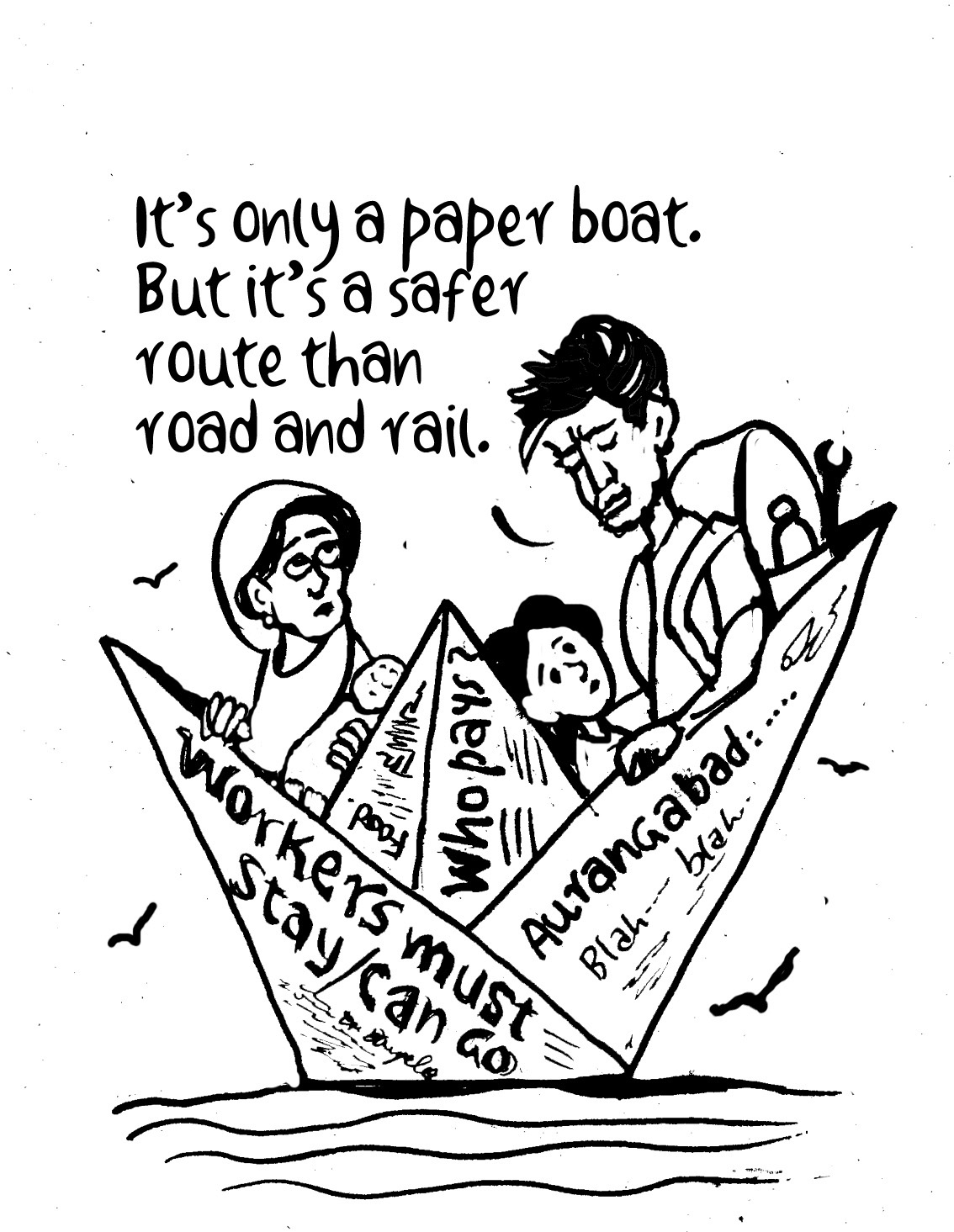“Time is no longer in the chromatism of bodies; it has become a monochromatic eternity.”—Delueze.[1]
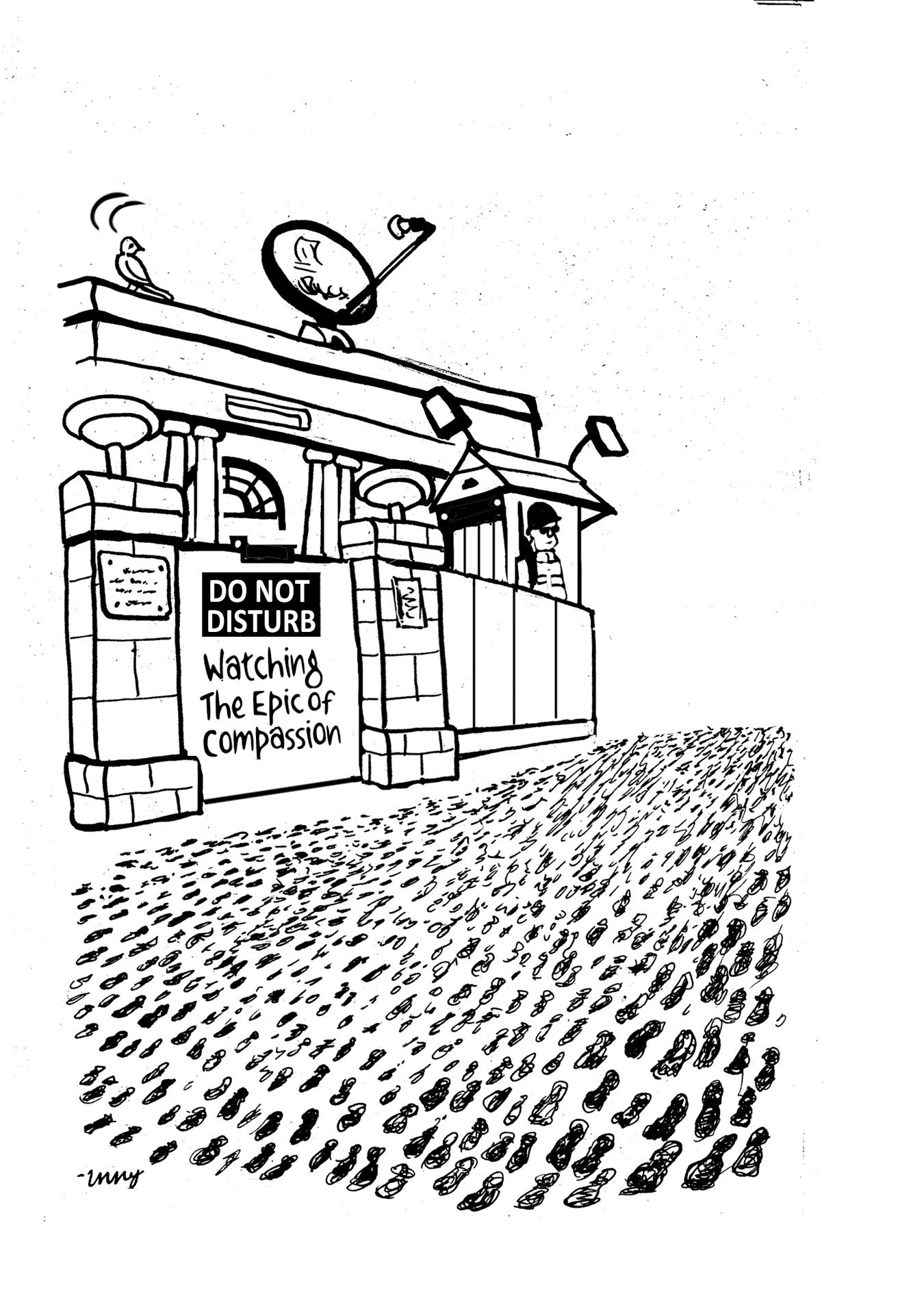
- Shruthi Ravi:
- Is there any playing with time in a single panel cartoon?
- E. P. Unny:
- By single panel you mean the one frame cartoon, right? No, it is almost instantaneous. Though you do take time scanning it, I mean ten or twenty seconds to look at it, but mostly it is like looking at a photograph or a frame. It’s a frame or a panel. Time doesn’t move.
(Conversation with E. P. Unny)
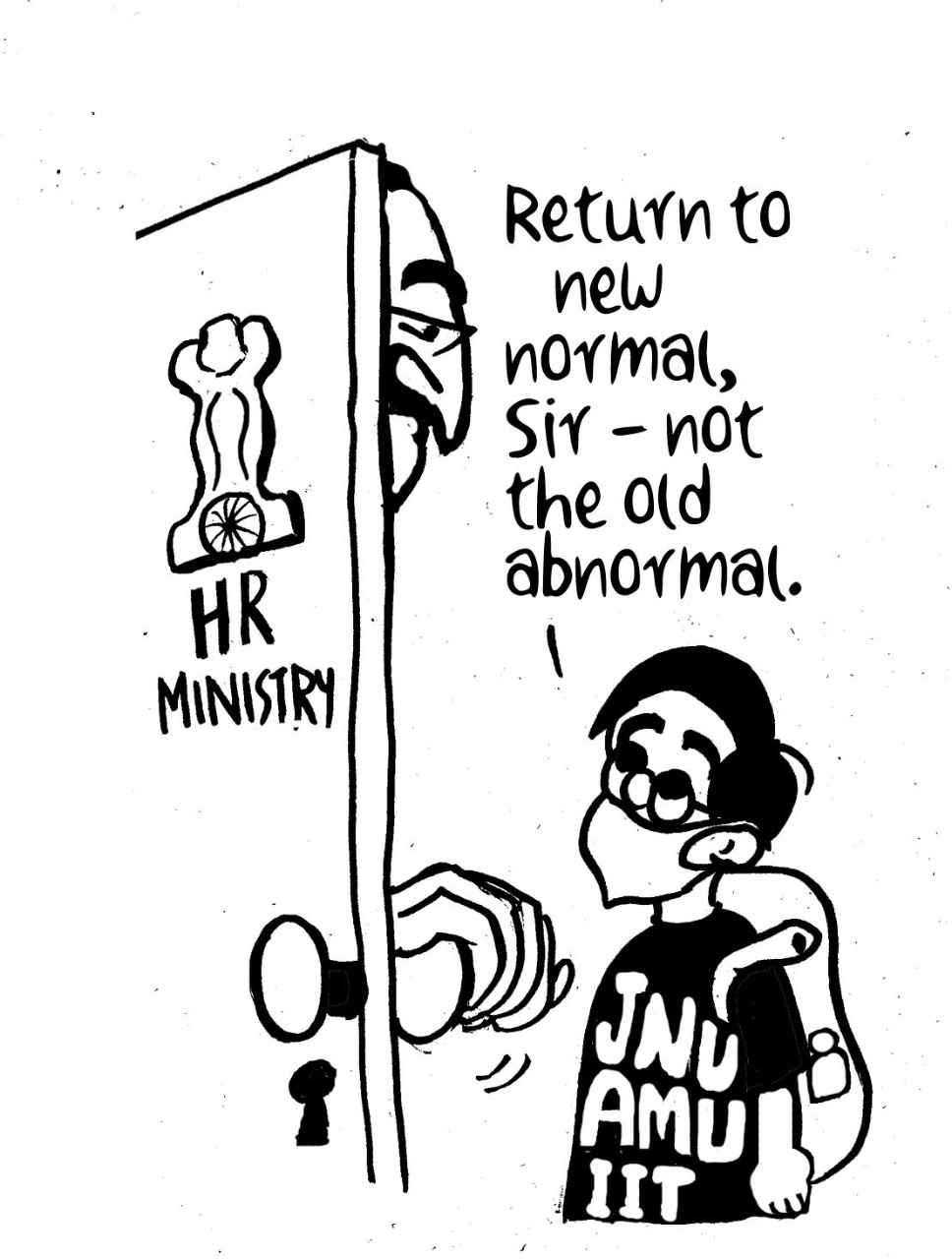
In a way the cartoon is perhaps the most inappropriate medium to express mourning or share the grief because cartoon in its popular understanding is meant to evoke satire, sarcasm, critical banter and sometimes wicked laughter. None of these emotions could jell with the collective mourning of the humanity for the lives lost to the virus-Covid 19. Even collective mourning, which is an expression of a humanly possible solidarity that we see in times of war and ravages has turned out to be an impossibility with the state protocols taking over the funeral religious rites in cremation. The funerals are no longer private affairs and familial. The visuals of collective funerals with no rituals and performative rites are getting viral in social media. Like the visuals from the war ravaged distant lands it may not evoke any special emotions perhaps other than a certain sense of fear of invisible enemy overwhelming the public. While in India it was our inability to express our compassion for the mass exodus of migrant labourers fleeing to reach their homes in the far remote Indian villages from where they had come to work and earn. Suddenly, we discovered to the utter annoyance of our understanding that the globalization mantra of ‘global village and death of distance’ is as good as a fake news item. The casualties of the ‘long march’ of Migrant labourers to their homes came as shocking reminder that ideas like “Aspiring India” were hollow sounding that meant nothing and what was being witnessed by the nation was just a trailer of devastation which had yet not started its full play. Then what could probably be its climax? “Climax”? “Is this some unfolding of a screenplay on screens of varying sizes?” Yes, we need mediations of screen to understand realities even though we may wish to compensate it with other nationalist fantasies. Mourning, compassion, sharing of grief—the elemental human emotions does require mediations in our present life.
[1] What is a triptych, Delueze, Francis Bacon, p 61, Continuum, 2005.
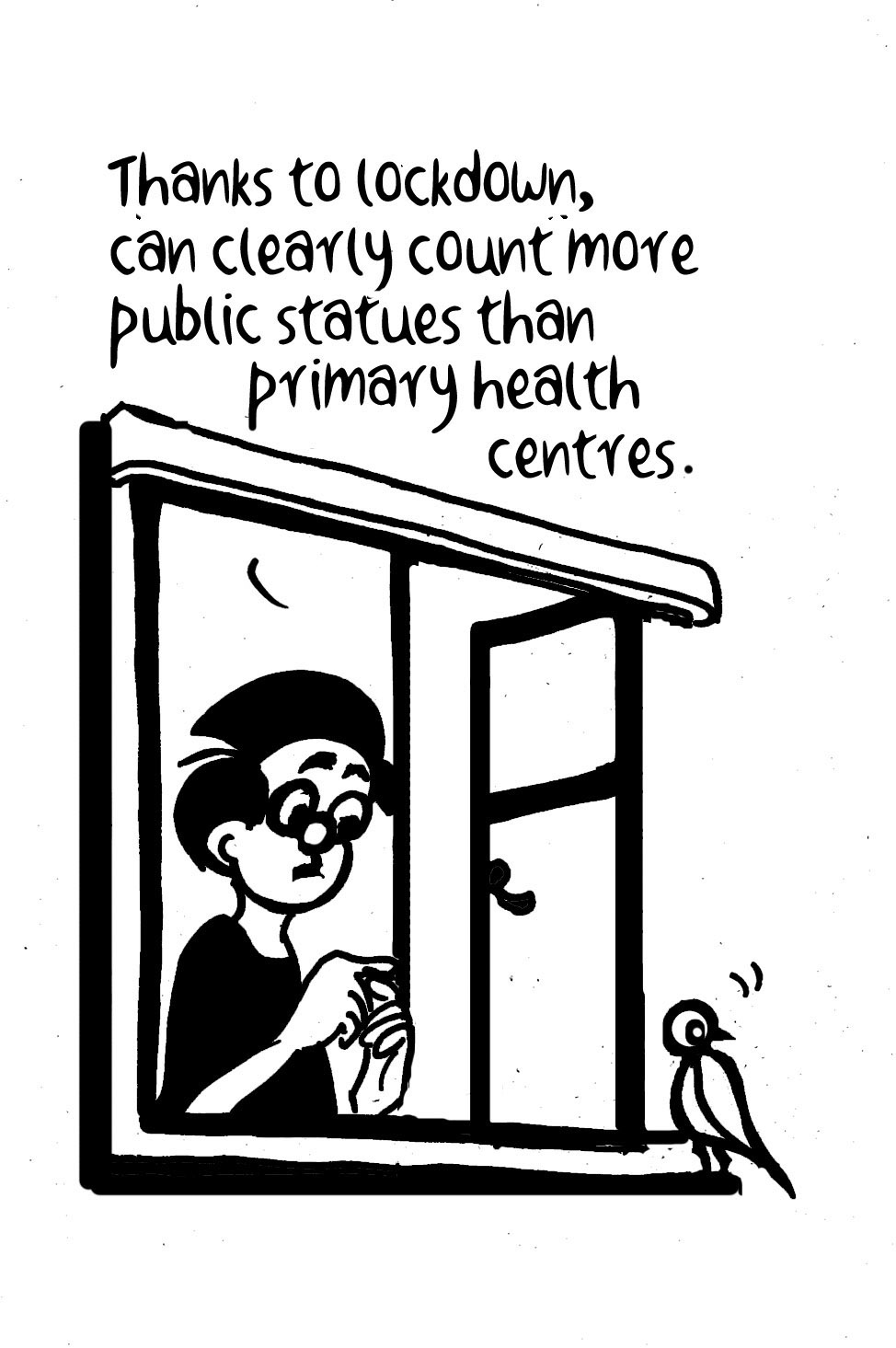
However, cartoons exist in a pre-screen ecosystem and also desist itself from on-screen mediations. Unlike the reportage, the daily news bulletin, other opinion pieces, MOJO transmissions, cartoons are pointed to a singular and specific aspect and within the single frame, it thus freezes time and expands to register that reality, which is dissimulated in numerous debates and sound bite remarks. It is characteristic of the cartoons to be reluctantly sensitive to the dominant narrative while attempting to pierce through it. It resists in its own ingenious ways to be subjected to the paradigmatic control of the gate keeper checked items that flow in and out of the media. This is a special feature of the cartoons in print media which could in no way be substituted or compensated either by visual media caricature programmes in television or social media trolls. Creative authorship is imprinted in the cartoons. This is something obvious. One more distinctly characteristic feature about cartoon as a media is “embeddedness in the context of tradition.” The cartoons recalls its tradition even its little brush strokes. Trolls have no such feature. The cartoons desist from obviously stating the reality like something that we see in trolls. It presents itself to the discerning reader to be attentive to ideas folded into its lines and touches. Cartoons, especially, political cartoons never submits itself to the partial preferences of political consensus and it always dissociates itself from what is given and perhaps this remains one reason for the cartoons being mostly cornered in the print layout as well as being attacked by the bigots. Political cartooning due to its embeddedness in its tradition strangely escapes the predilections of post truth demands on media. It is in this mode of understanding that we need to look at E. P. Unny’s cartoons on lock-down imposed by the government for the containment of the pandemic. This experience of a global pandemic and more than a month long lock down is unprecedented.
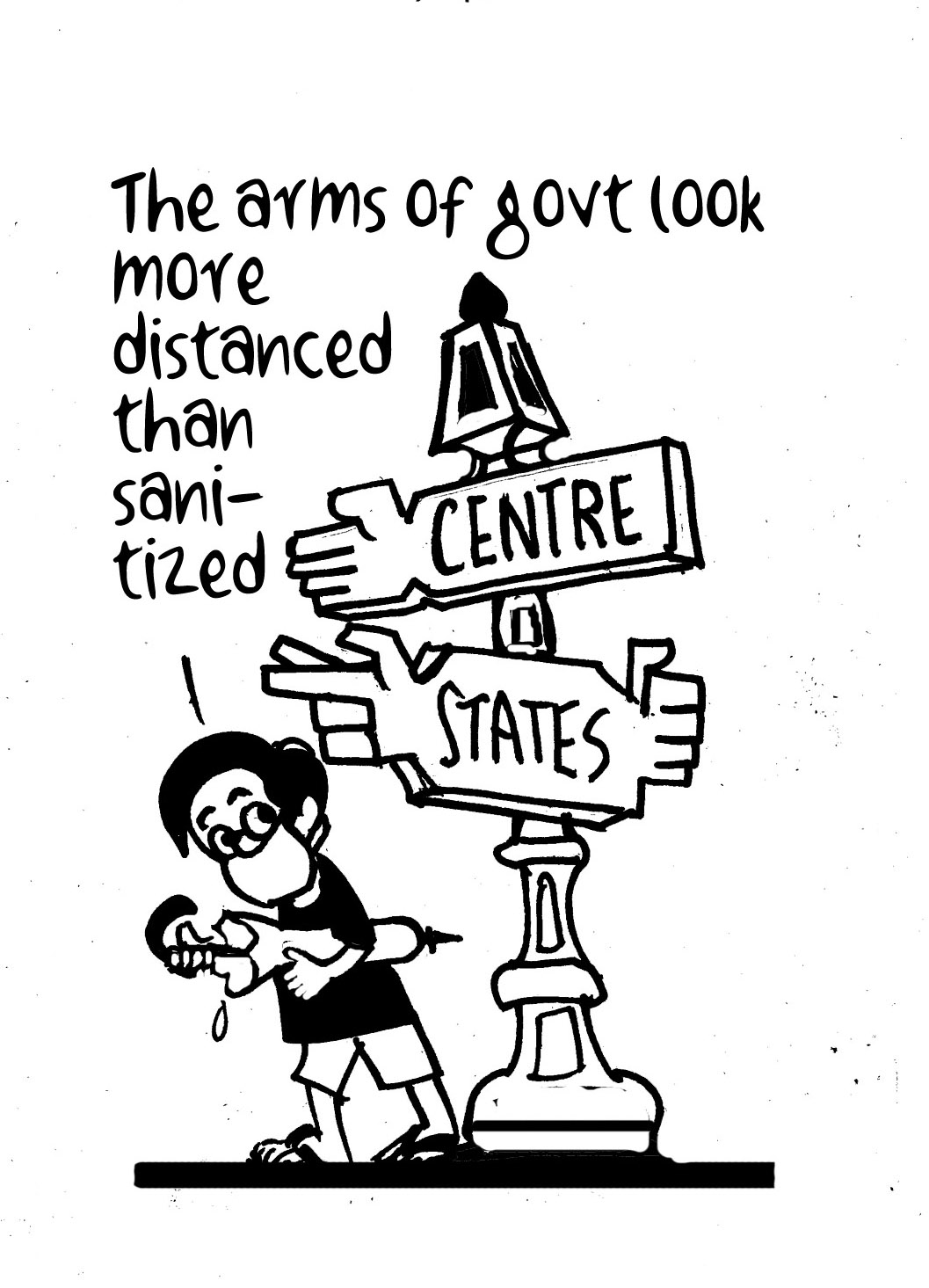
E. P. Unny’s lock down cartoons dissects into the normative discourses of governance and pliable media reports and in its own distinct way captures the worst of fates that resulted from the governance measures, which was supposedly an extreme, emergent and exceptional measure that State undertook with little thinking about the consequences to tackle the Covid crisis. Suddenly, it all became the “new normal”—a catch term that could mean either way. One cartoon of E. P. Unny shares this distaste of oft repeated notion of ‘new normal’.
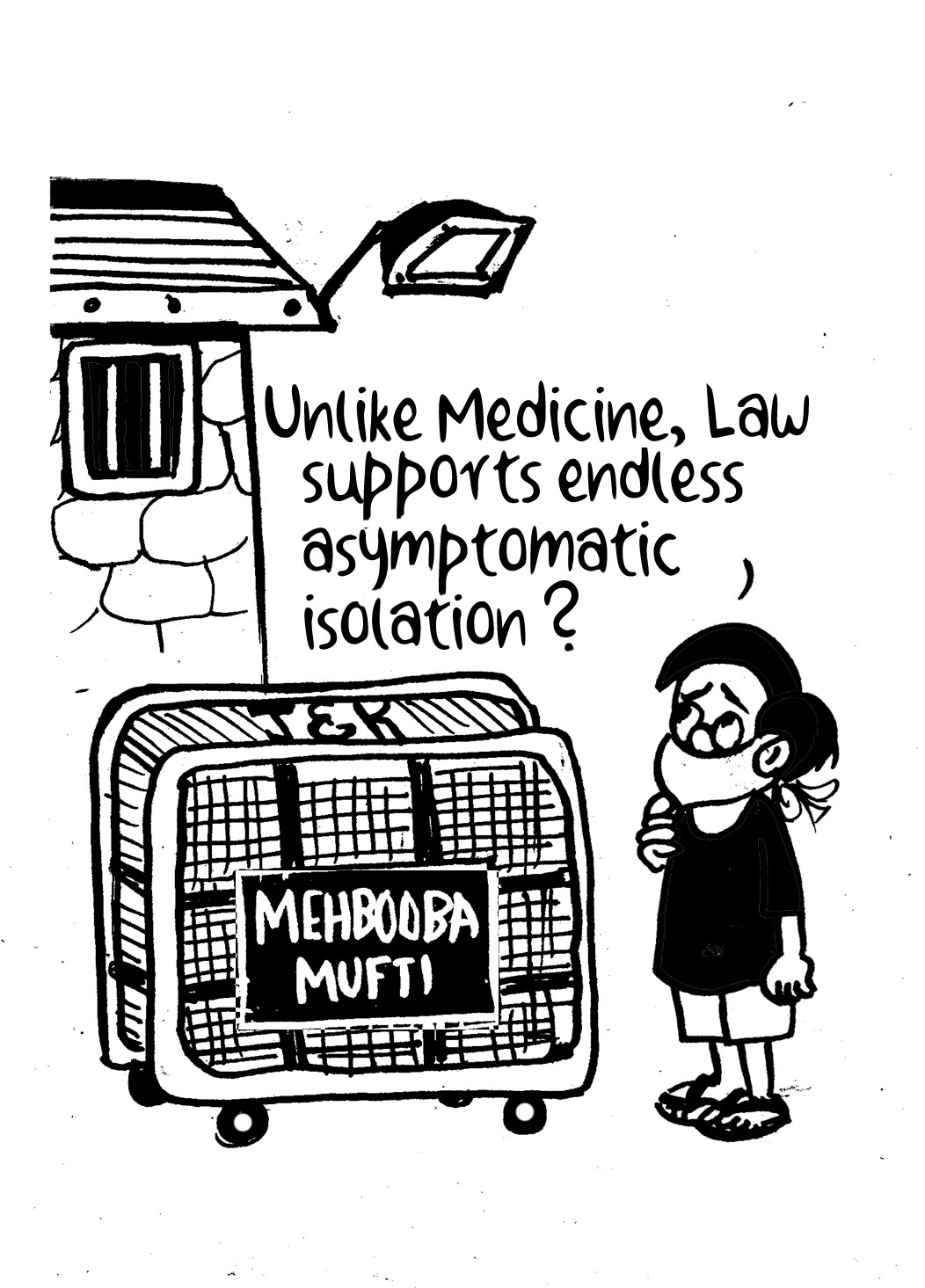
One major concern shared across during the pandemic was about the importance of public health initiatives. The threat of social spread of virus was mainly contained by social distancing and slew of measures by the state health agencies. However, this welfare measure was largely ignored to the extent that in many Indian states the public health systems were in a dysfunctional state. In developed countries too, this was a major issue. The privatized health system due to its apathetic logic could not well respond to the immediate demands. In contrast to the extravagant spending of the State, the public health received only a negligible share from the annual budgets. One cartoon directly calls attention to this aspect of the lack of support public health systems received. The cartoon depicts the mismanagement and siphoning off of funds for statues ignoring the demands for public hospitals. (Cartoon-Statue/Public health).
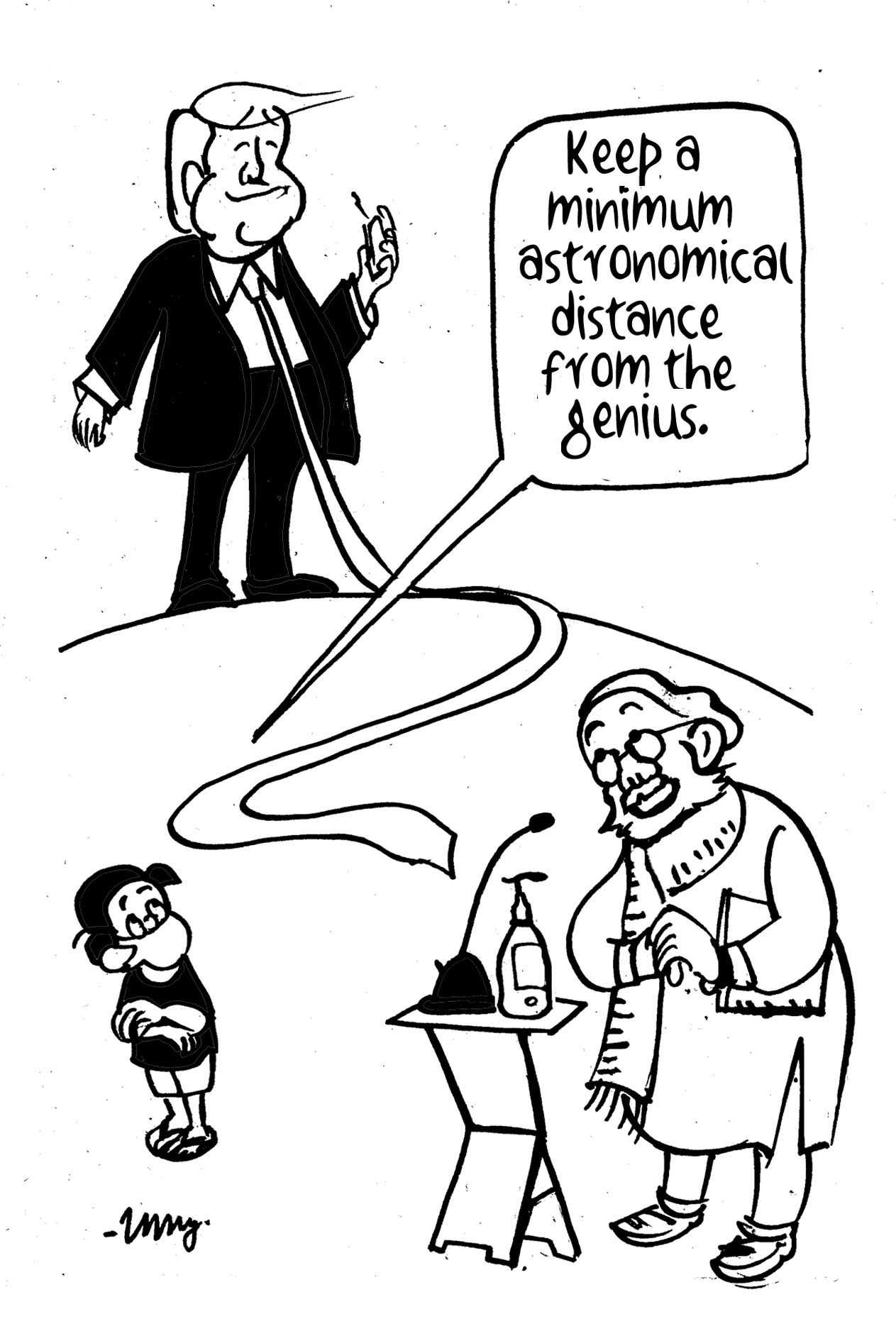
Indifference of some of the state to respond to the crisis in a true humanitarian way also finds depiction in several of E. P. Unny’s lock down cartoons. In this cartoon (Cartoon-3), the two key terms from the pandemic manual is inverted to produce exactly the opposite effect where you find the mechanized hands of the governments failing to deliver what they ought to. The government remains unclean and distant from the needy. The quirky logic in this cartoon disrupts the central tenet during the pandemic and lock down, which was “trust the State”. No matter what the character of the State is, it was no time for political opposition because the primary human instinct was to survive and therefore it became obligatory to follow the orders of the State.
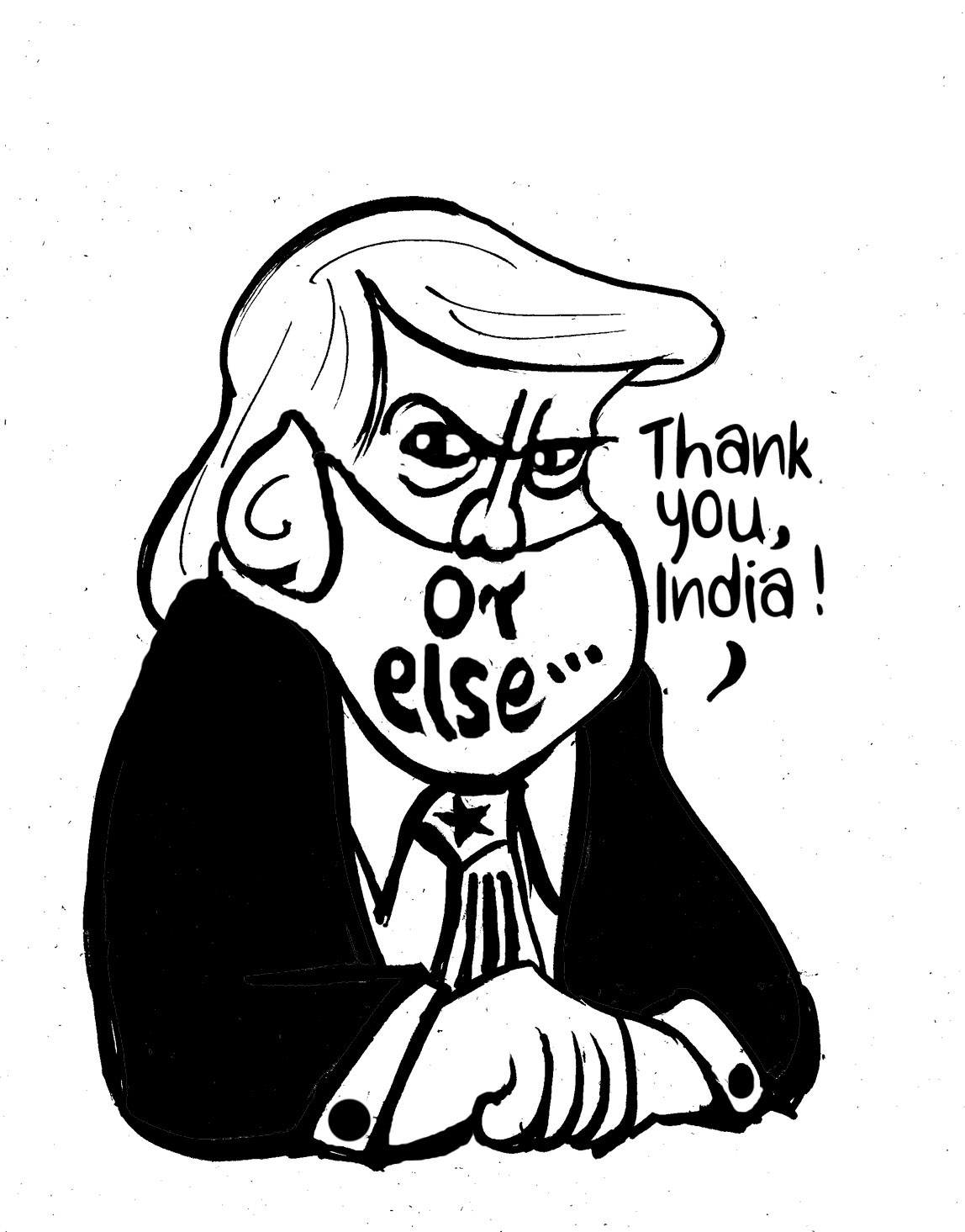
The primary response of all sovereign States to the virus attack was to put the Nation under lockdown. It is a long held solution which the science of epidemiology also endorses. The liberal politics well versed in bio political arrangement has already shifted its politics to mere management of the population through governance techniques. However, the right wing with its inherent whimsicality for drama has no such received ideas on population management and it has to play its own version of dramatic politics on its traditional priorities to stay afloat in a multi party democracy. However, it is worrying to note that a Right wing trained in bio political population management techniques with perfected skills in dramaturgy can cost democracy dearly. (The signs of up skilling were occasionally visible from the times of its management of demonetization and NRC). But then the politics exhibited itself to be asymptomatic of the worst ever crisis that had hit economy and livelihood of vast majority of people pushing them to immediate destitution. E. P. Unny’s cartoon pierces through its surgical brush strokes the overtly asymptomatic expressions of the politics to capture the deeply infected internal organs of the body politic. One such cartoon that turns upside the idea of ‘asymptomatic’ and ‘isolation’ is the one on continuing house arrest of Mehbooba Mufti, former CM of Kashmir and PDP leader.
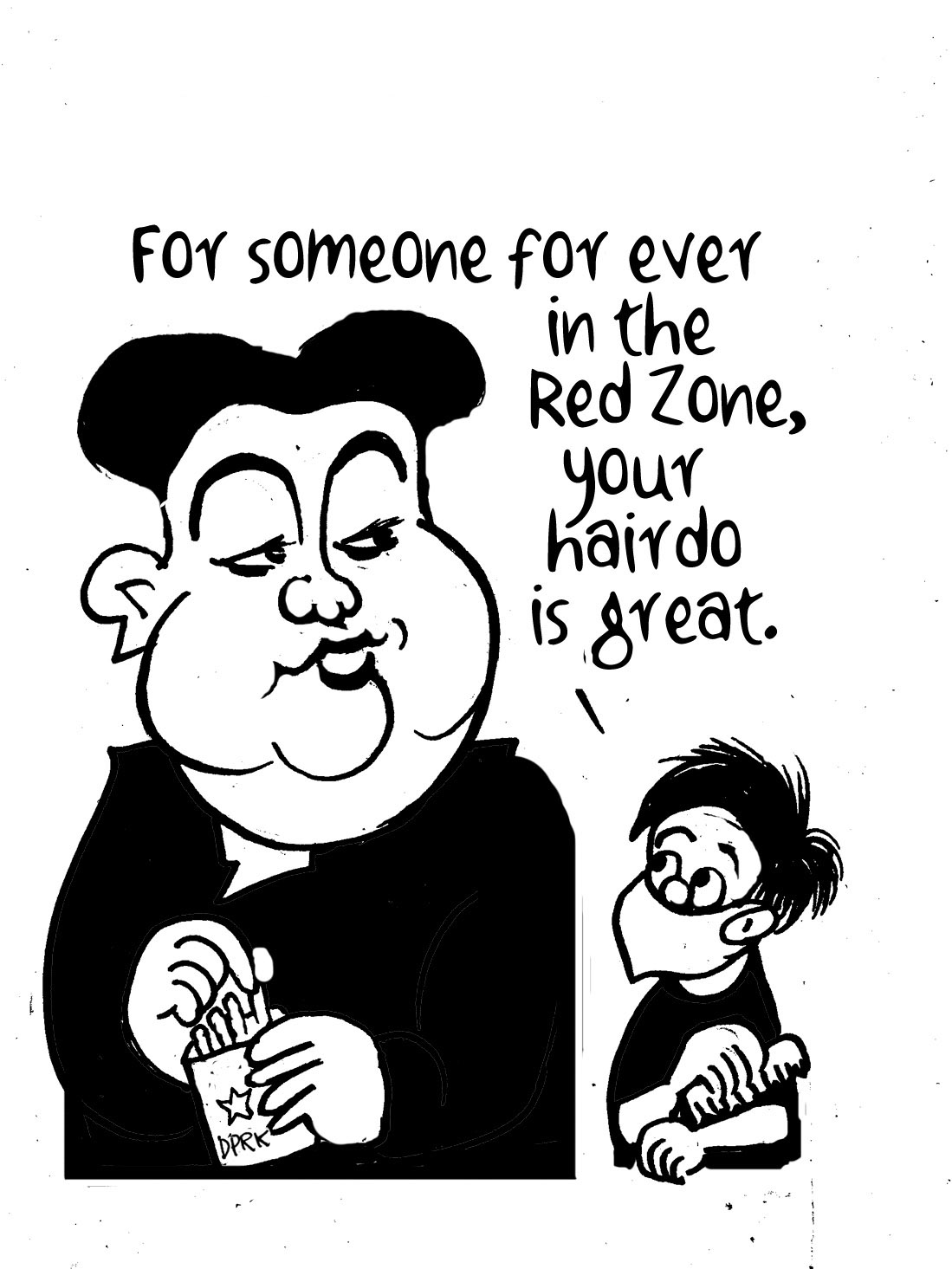
The cartoon takes on the biopolitics of medical management with an interesting turn. It says: “Unlike Medicine, Law supports endless asymptomatic isolation”. In the cartoon piece, there is no human presence of Mehbooba Mufti. It has just one prop of a suitcase captioned J and K and a profile of a shelter in the background.
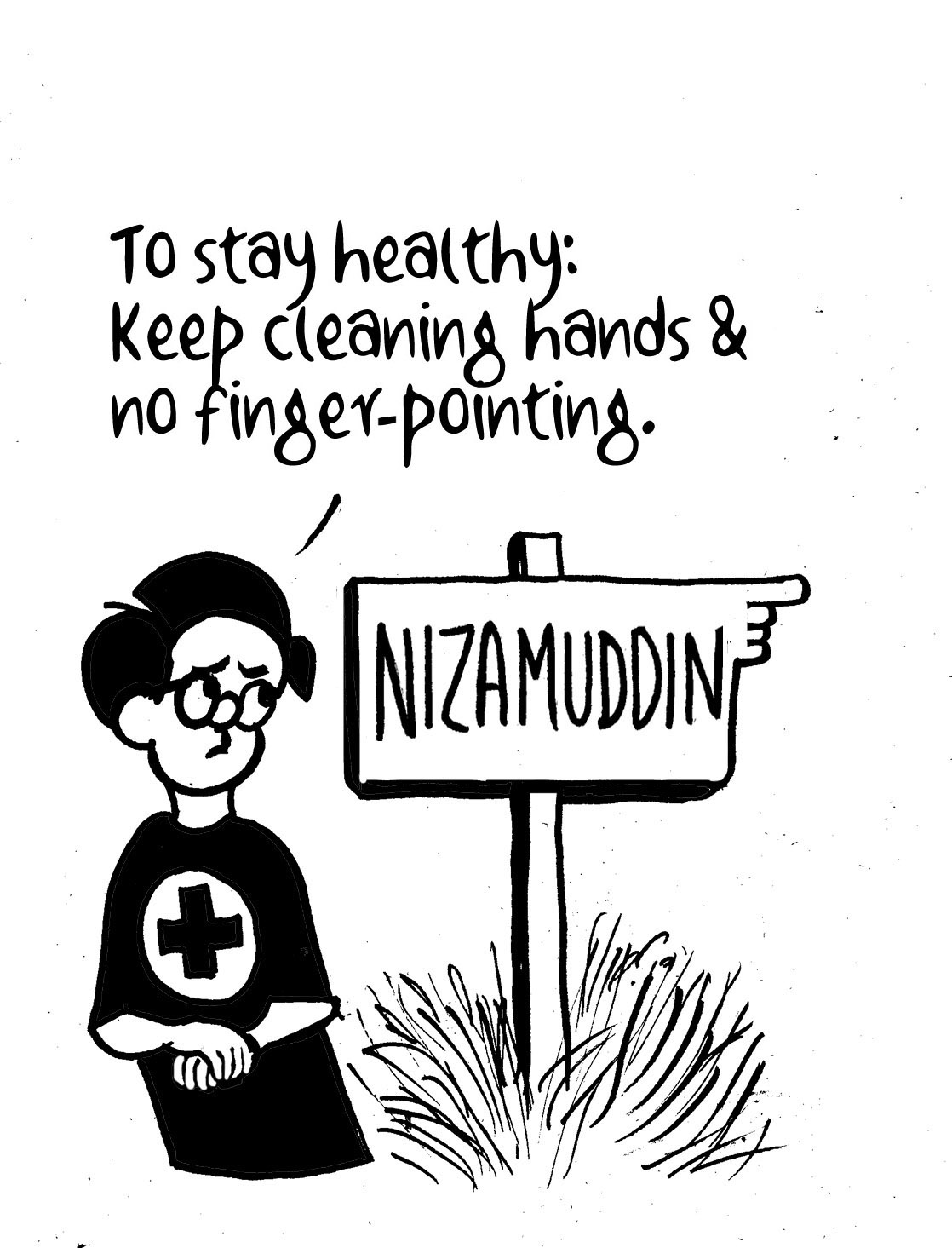
Social distancing, washing hands with soaps and also wearing masks are the essential components of the survival-instructional manual issued by the State after state. This has become what in contemporary parlance is termed as ‘new normal’. E. P. Unny has a few interesting takes on the new norms and they are surcharged with political current as well. One is captioned as ‘keep an astronomical distance from the trump’. In this cartoon (4), Trump is visualized as Hardy (Laurel and Hardy) like figure with his long American tie and towards the corner right you have PM Modi standing and in his front there stands a table with sanitizer. Similarly, the cartoon on Tablighi Jamat meet at Nizamudeen also twists on the idea of clean hands and pointing of fingers. Red zone, wearing of mask gets interesting twists and turns in these cartoons. The mask worn by Trump is printed with a warning sign to India. The interesting aspect of this cartoon (5) what is explicitly stated is words of gratitude but the threat is printed over the mask while it is in effect more explicit than what is clearly stated.
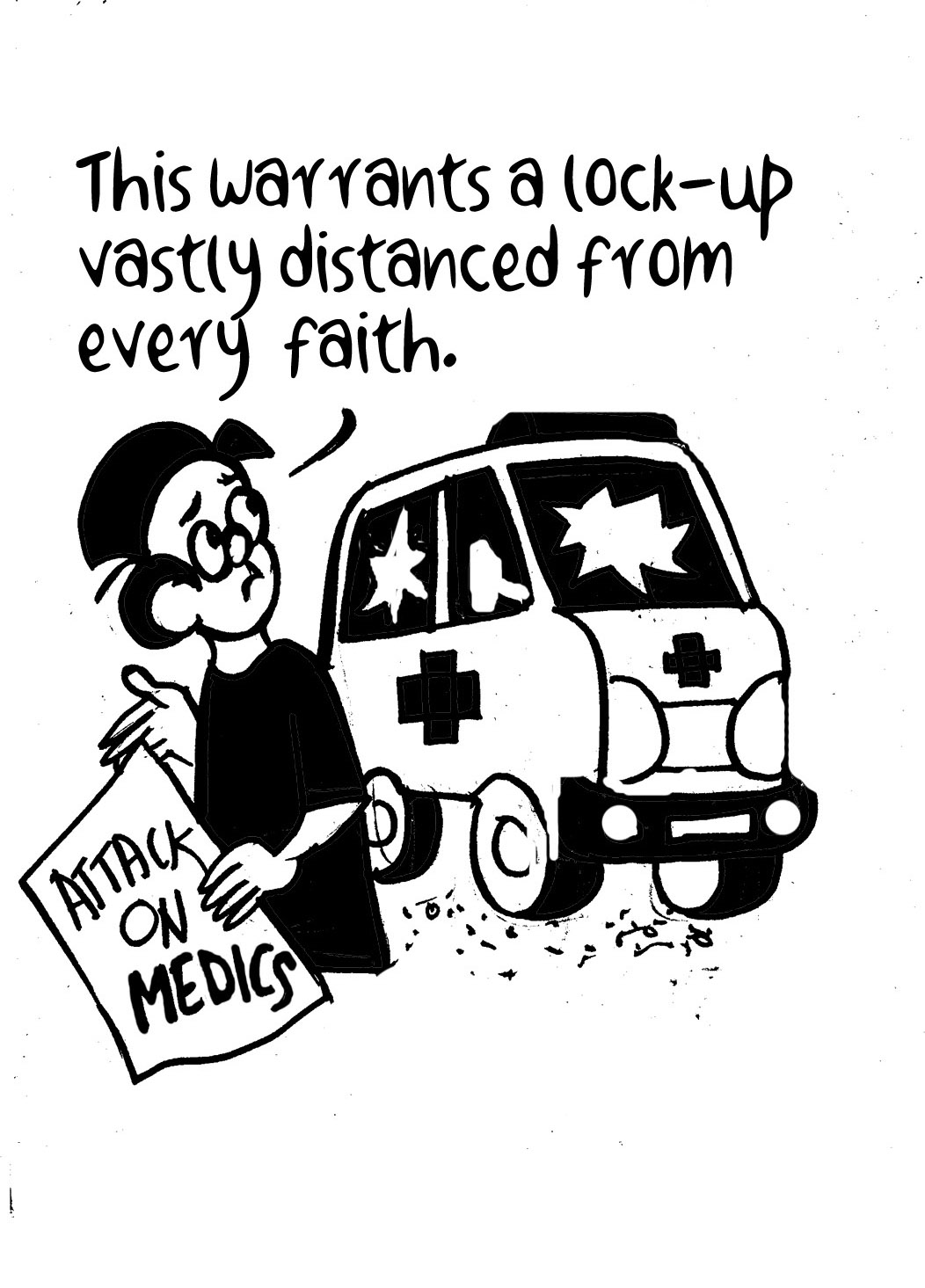
In Red Zone, North Korean dictator Kim is illustrated to express the closure of barber shops. Someone has actually pointed out that the hair growth has become a factor aiding emotional depression during lock down. There were numerous rumors about North Korean dictator Kim being unwell or even dead during the lock down period. However, later a few photographs of Kim inaugurating a factory was circulated ending for a while the rumors about Kim’s death. The uniqueness in the cartoons is to blend two or three ideas, which obviously has no such specific relations but when connected with each other produces a different order of meaning.
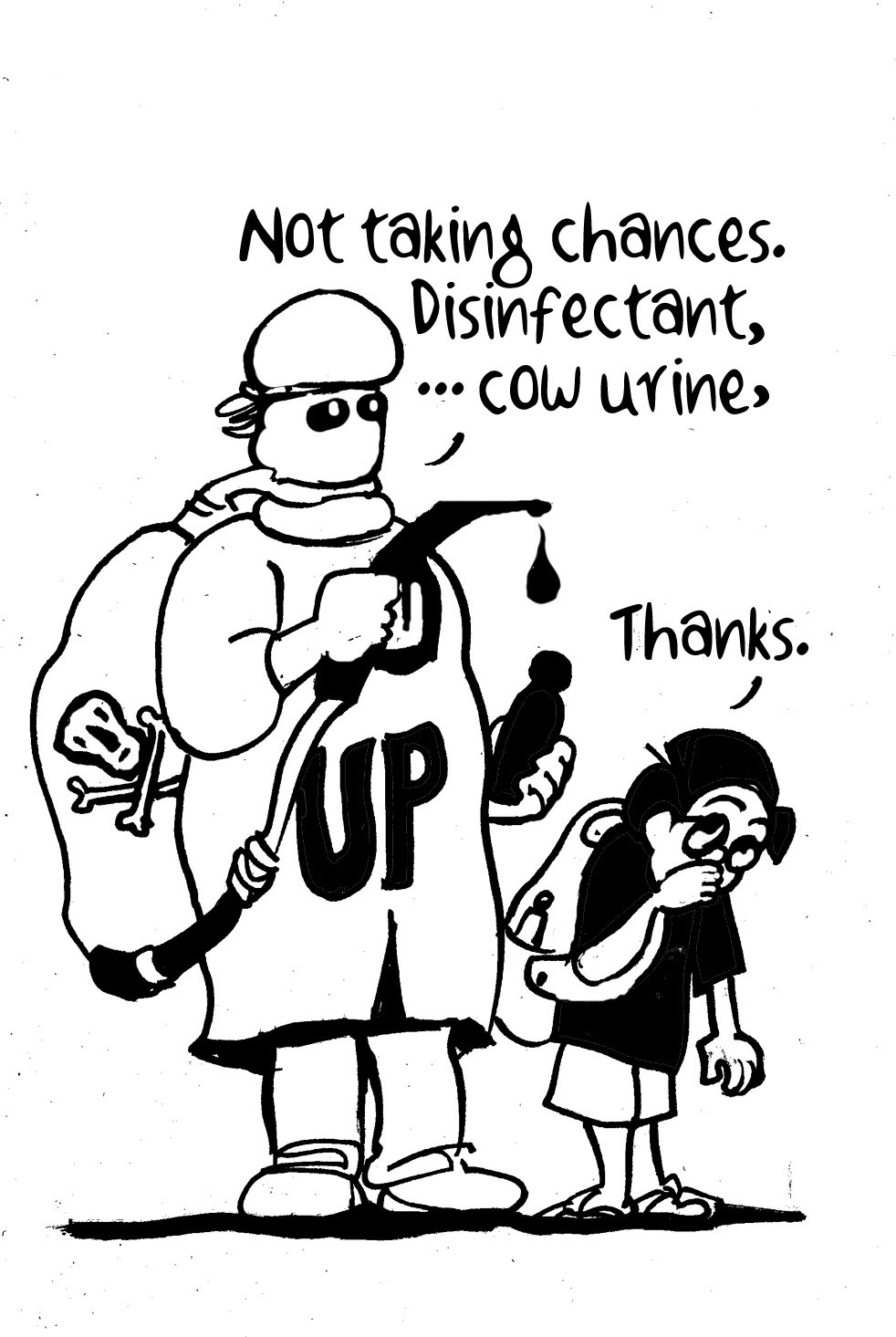
While governance measures were tightened to strictly implement the lock down, the front line staff which includes Doctors, Nurses, Paramedical staffs were facing a different kind of apathy even after Prime Minister Narendra Modi had asked people to display respects for them by clanging pots etc. In several places, the health workers were tyrannized or attacked. Some were denied entry to their homes. In some extreme cases, the health workers were hounded out from the places they were staying. It was trying times for them. After long hours of duty they found themselves being attacked as carriers and spreaders of virus despite Government’s call to take strict police action against anyone who harmed the health workers. The organized media—TV channels, print media and known online news sites-had stories supporting and cheering up the front-line staff. The media could not have done otherwise as they were also in the front line in reporting to the country the course of the pandemic. The support rendered to the front line staff is a mature response of a society that understood and saw the reason in the following what medical sciences had to offer however limited it was. The cartoon “Attack on Medics” is a take on this and it is bluntly captioned on the top side as “lock up” as a way to deal with it.

The media regularly with an optimistic note reported on the scientific and lab activities being undertaken for vaccine development. The single protocol to be followed in this was to listen to the scientific advice whatever be its limited understanding of how society functioned. If this was the situation world over, in India there was funny shades to the ‘indigenous’ medicines discovered by fringe religious groups. One such was the advice of drinking “Gomutra”, urine of the cow, as a cure for Covid-19. With responsibility, media reported about how such calamities are being used for spread of pseudo scientific ideas. While such rabid ideas of contagion containment happened regularly, some ministers of the Union government were also tweeting about other indigenous treatment they knew about. But the gruesome incident took place in UP where the fleeing migrant labourers were sprayed disinfectant. The video became viral over the social media. Except for one to two national television channels, this gruesome incident was something to be ignored. They didn’t see any political value other man making their political bosses embarrassed about the deeds of their government officials. E. P. Unny picked this up for his cartoon.
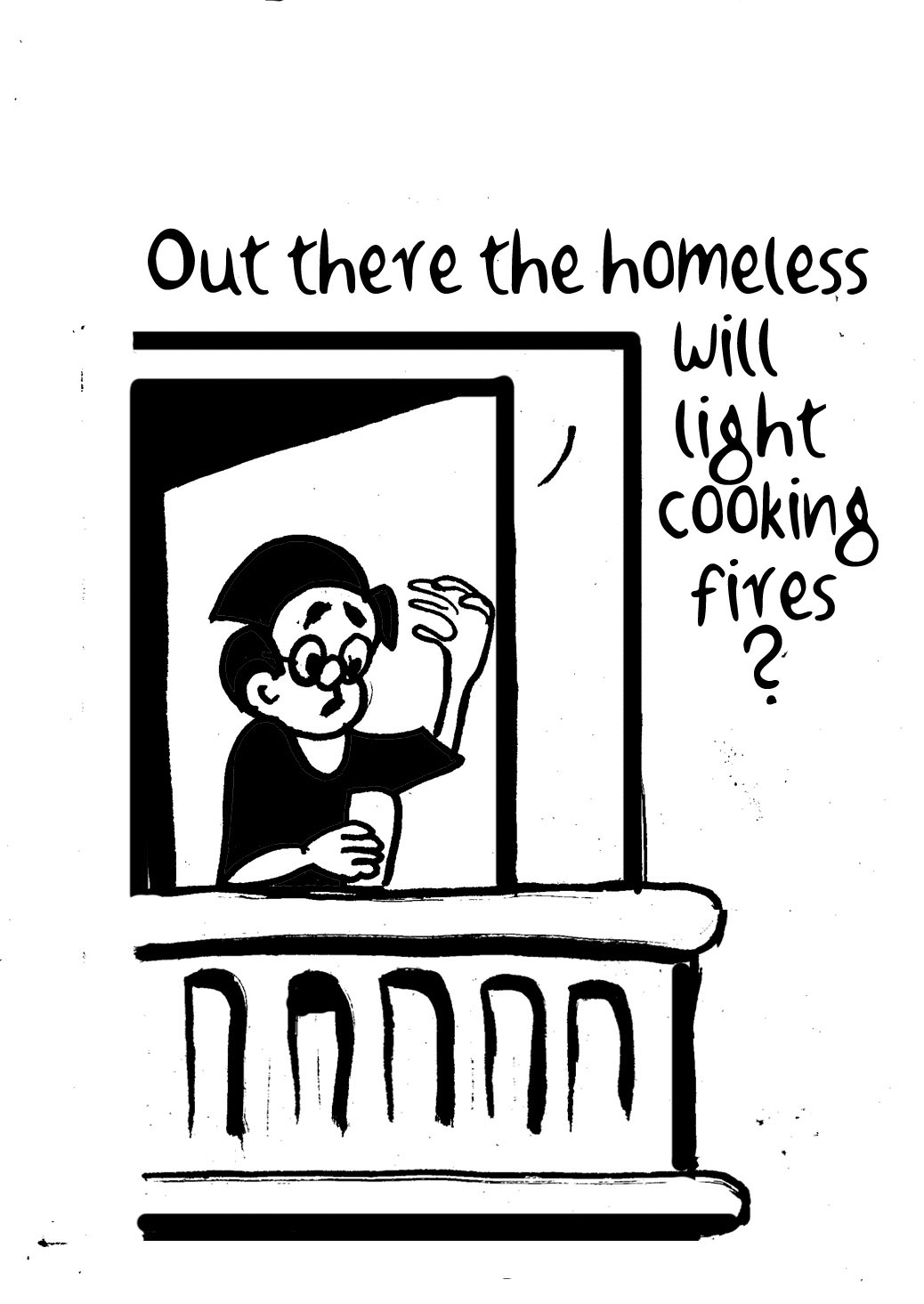
The big brother official of UP wearing PPE suits spraying cow urine as disinfectant showed the larger image of an apathetic state. The official in the cartoon carried on his shoulder a bag that had the figure of death stalking skeleton while he carried a small bottle of cow urine in hands.
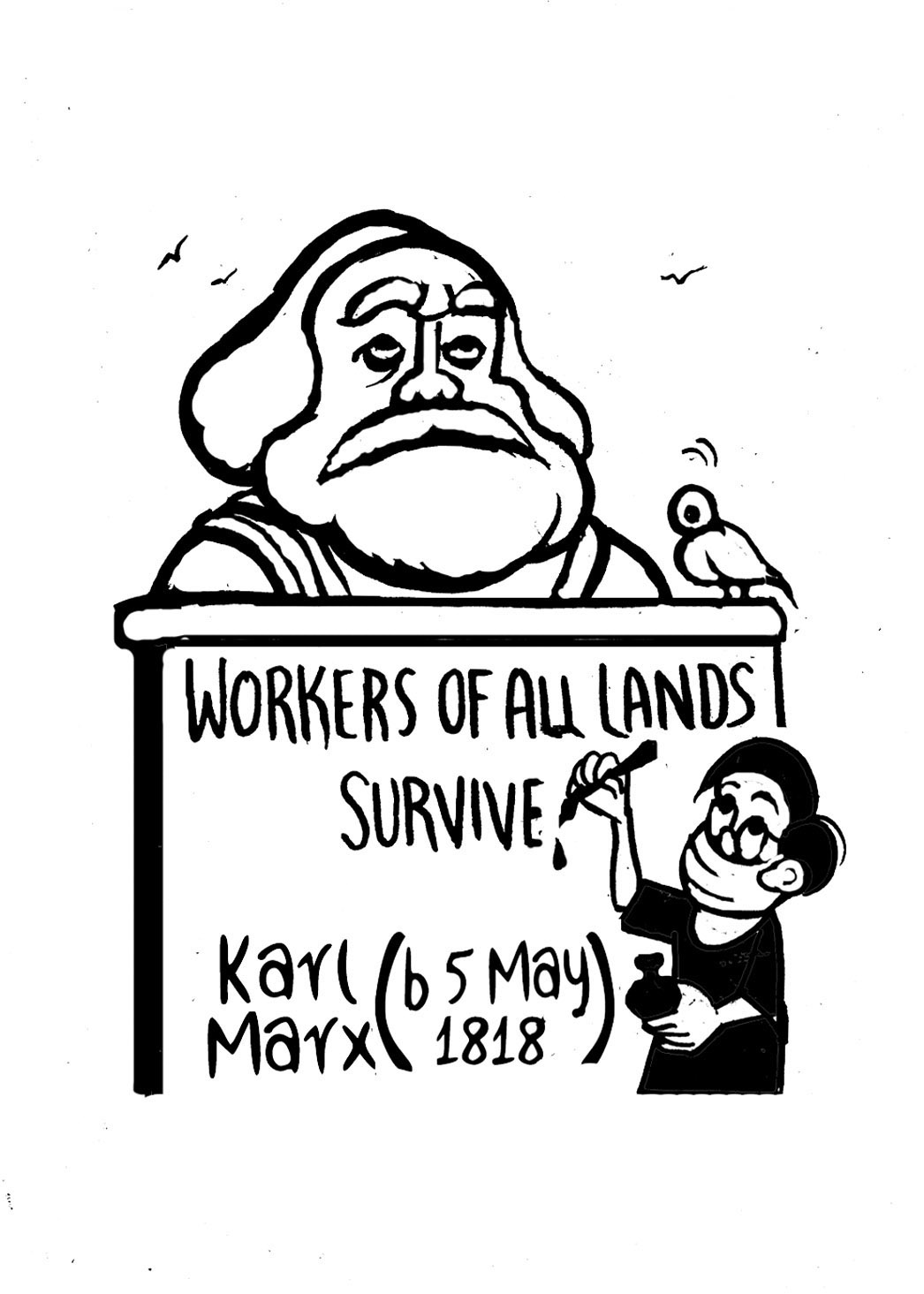
In the preceding day to the nationwide lock down, the information and broadcasting ministry of India decided to re-telecast the television serials of epic Ramayana through national broadcaster, Doordarshan. Vivifying the nostalgic memories of a Bharatheeya middle class, the government had only a limited interest in soothing these souls with “epidoses” of Ramayana. Next day after the lock down began, a Minister in the Union cabinet had tweeted with a picture of him comfortably viewing the epic at his official residence. He later deleted the tweet. While this epic of compassion was being telecast over the television, a large exodus of migrant laborers has started to flee from the cities they live for work. They had nothing to be comfortable about. Devoid of job, food and a shelter, the migrant labourers had no other choice than to walk back stretched over miles to their home places. Their home places being so distant and with no modes of transport available, they had to literally walk the miles. There was a hue and cry over the issue. The State governments after State governments appealed to the migrant labourers fleeing the city to stay back and assured food and shelter. However, it had little impact. The apathy and misery they have all along encountered seemed to worsen their fears. The apathy was more so visible in some private national television channels which reported that the labourers were instigated to crowd themselves and create mass discontent. It evoked the haunting images of exodus during partition time. The fleeing migrant labourers were treated as a health security problem by the nation reeling under the pressures of virus transmission. The rich and the salaried middle classes were worried whether this would exacerbate the calamity. E. P. Unny’s cartoon on the coziness of isolationism of the rich class and mass exodus whose body-less visibility is captured in this cartoon. (Cartoon-Epic of compassion).
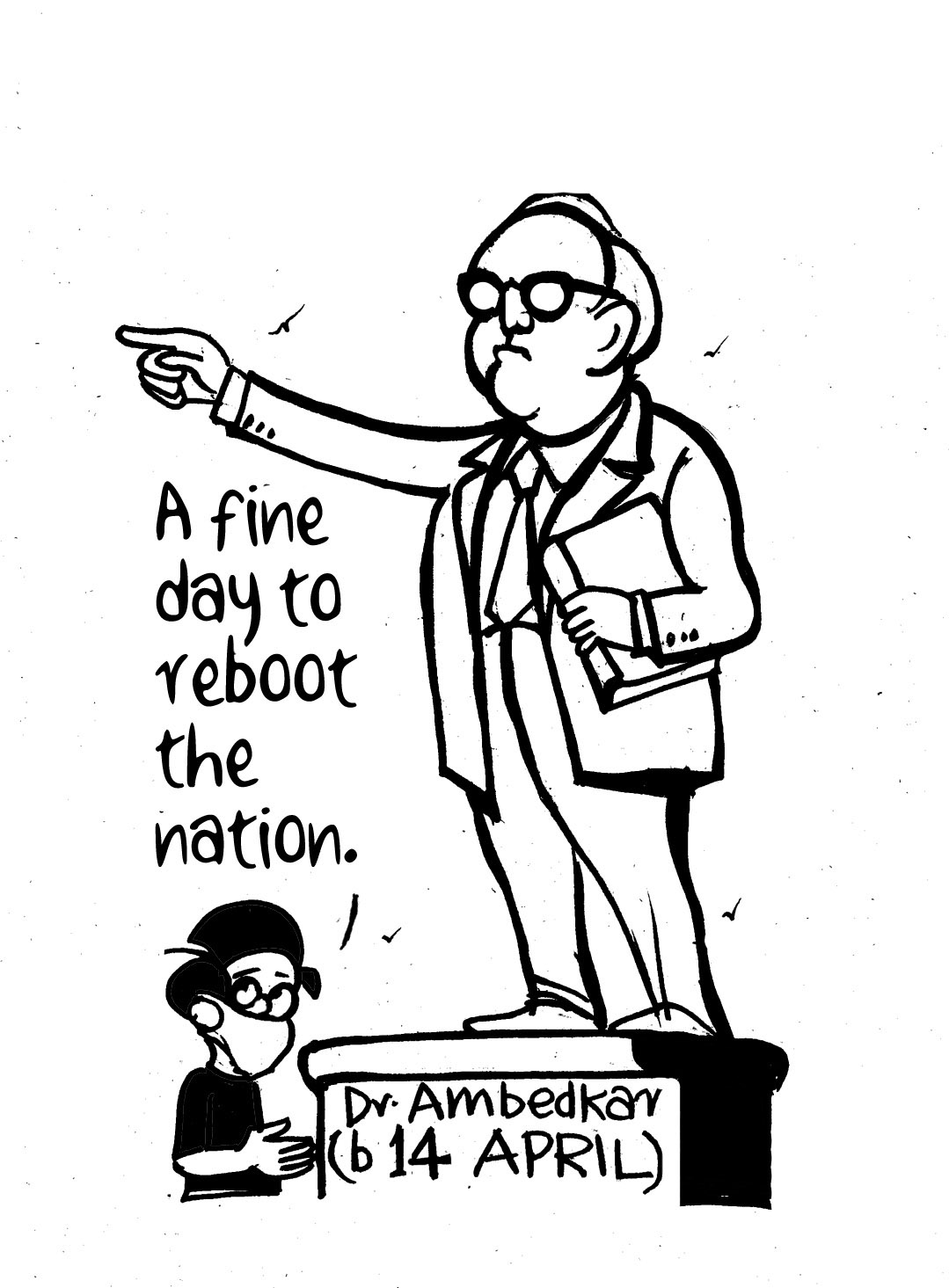
The single caption of “epic of compassion” captures the heartless, soulless, apathy and indifference for the migrant labourers. The cartoon brilliantly demonstrates the castling of the elite ruling class from the glaring condition of poverty and wretchedness. Amid this disturbing situation which was going on unabated, the citizens of India had two rounds of ‘coming together’ as urged by the Prime Minister to clap hands, ring bells and a few days later to light the lamps. A cartoon on homelessness and light from the cooking fire pokes at the privileged class for their fascination for the easily demonstrable ideals. (Cartoon on light from cooking fire).
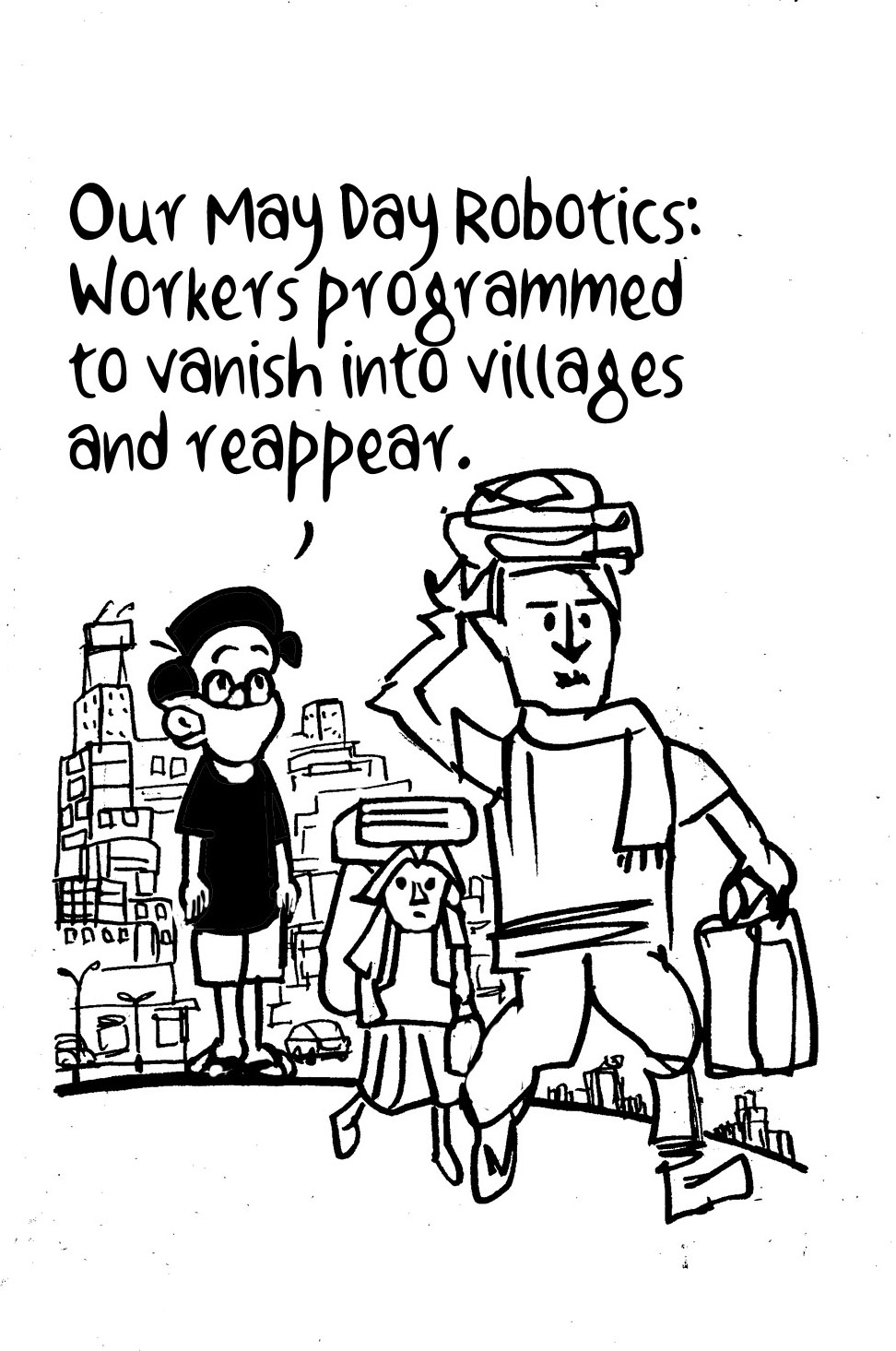
The rate of spread of covid-19 was out beaten by only one thing: the virulent viral spread of fake news. Pandemic could not quite literally catch up with the infodemic. It was the unverified, non-fact checked rumors, false reports, statistical data, bit information on medicines, health advises on prevention and recovery and also stories that intended communal ravage that spread faster than wild fire through new media platforms. Islamophobia was rampant in viral media. Palghar incident was a direct outcome of communal mongering through social media. However, the mainstream channels doctored the fake news story into a national debate with clear intend on spreading politics of hate and “othering”. Tablighi Conference at Nizamuddin also was seized upon as an event for social stigmatization and hate mongering. The shocking aspect of it is that some mainstream media ran such stories as if the distinction between it and the social media just blurred. The world was compelled to take attention of the rampant Islamophobia and hate messages getting viral through social media platforms. E. P. Unny’s cartoon on Nizamuddin is remarkable in this context with figurations of the supposed “other” and clearly stating about the clean hands and no finger pointing. The cartoon on ‘attack on Medics’ seek attention on the attack on medical workers based on false and ill information about the spread of Covid-19.
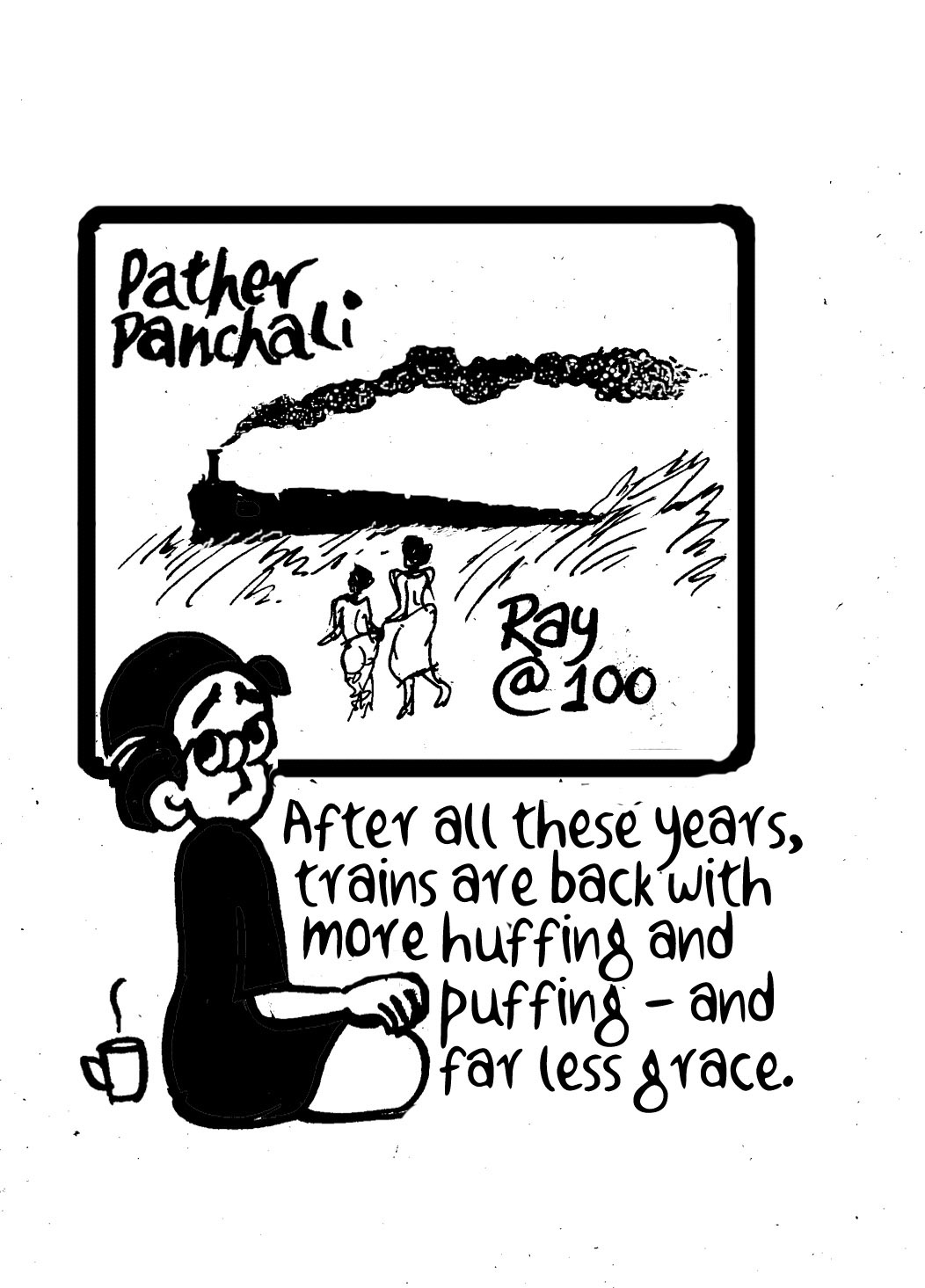
In between events, during the lock down, which would have been just by passed as one of an event during the lock down distinctly appeared in E. P. Unny’s cartoon. Ambedkar’s birth anniversary, Marx’s two hundred birth anniversary, Bollywood’s brilliant actor Irrfan’s untimely death, May day and 100 the birth anniversary of Satyajith Ray. These events that occurred in between the lock down found space in the cartoon and it were all treated and textured with the seething problems of covid lock down. In the cartoon, which was homage to Karl Marx, the representation is that of Marx’s statues at High gate cemetery. The words scribbled beneath the statue of Marx are an interesting twist of “workers of the world unite” to “workers of all lands survive”. It captures the massive subjection of the working class population to the extremities of lock down mismanagement. In the cartoon commemorating Ambedkar’s birthday, the caption is kept simple: to reboot the Nation while in the drawing on Ray’s 100 birth anniversary, the classic scene of train is evoked to connect with the exhausting train journey of taking migrant labourers to their home from their place of work. The May Day cartoon integrates into the pandemic period appearance of robotics as a substitute to the worker. The cartoonists connect it with disappearance of workers to their villages vacating the urban spaces for the AI to occupy. In another cartoon, Chaplin’s Modern Times is invoked to depict the anti-labour amendments to the existing law. One of the real consequence of the lock down is presumed to be making labour laws flexible for the benefit of Capital. Yogi Adityanath Government in order to short circuit the economic slowdown has decided to overhaul the labour laws. The amended laws have extended working hours and other hire and fire policy. The amendments proposes to take back the labour and capital to primordial times of capitalist accumulation where wage labour resembling factory workers predicament in Chaplin’s Modern Times. The question of economic justice gets some prime importance in E. P. Unny’s cartoons. During the lock down, the economic down turn was a seriously debated topic. A fewer cartoons concerns with the economic proposals of the Union government and also Finance Minister’s announcement of stimulus package. In one cartoon, the announcement of 20 lakh crore stimulus package finds expression. Before the announcement the Nation also had witnessed Prime Minister asking the citizens to support the local. In the cartoon, 20 lakh crore is pictured on the screen while the caption says: “If corner shop is shut, try Photoshop”. To augment the appeal for citizens, the Photoshop is a fascinating option and used several times before. The extended financial support for space projects is contrasted with no particular economic package for the destitute migrant labourers. Arogya Setu surveillance finds a reference in the lock down cartoons.
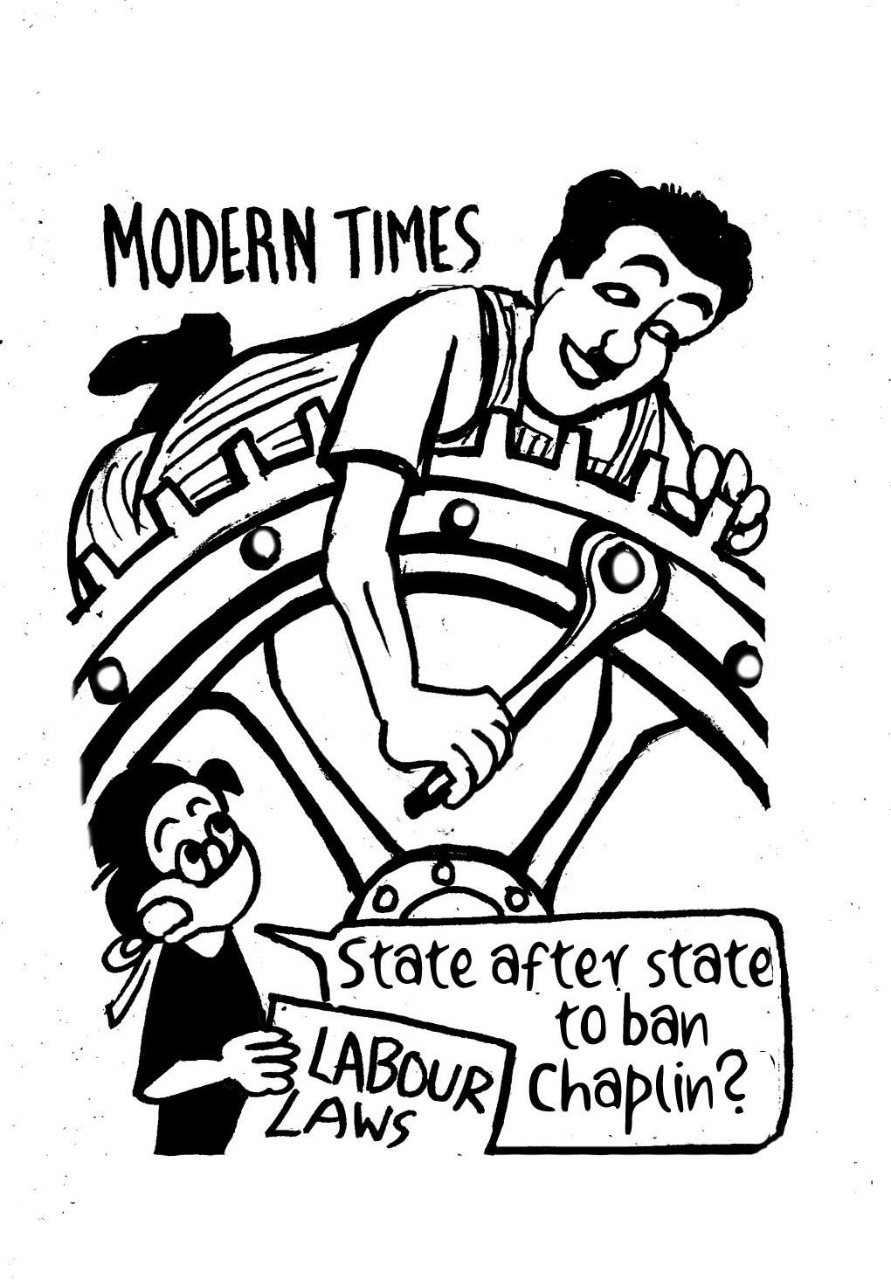
The labour makes its appearance in Unny’s cartoons as the product of neo-liberal order and innumerable bare foot prints of the class depicts the acutest dehumanization that has been pervading all realms of human life and engagement. (Cartoon govt catching up with…)
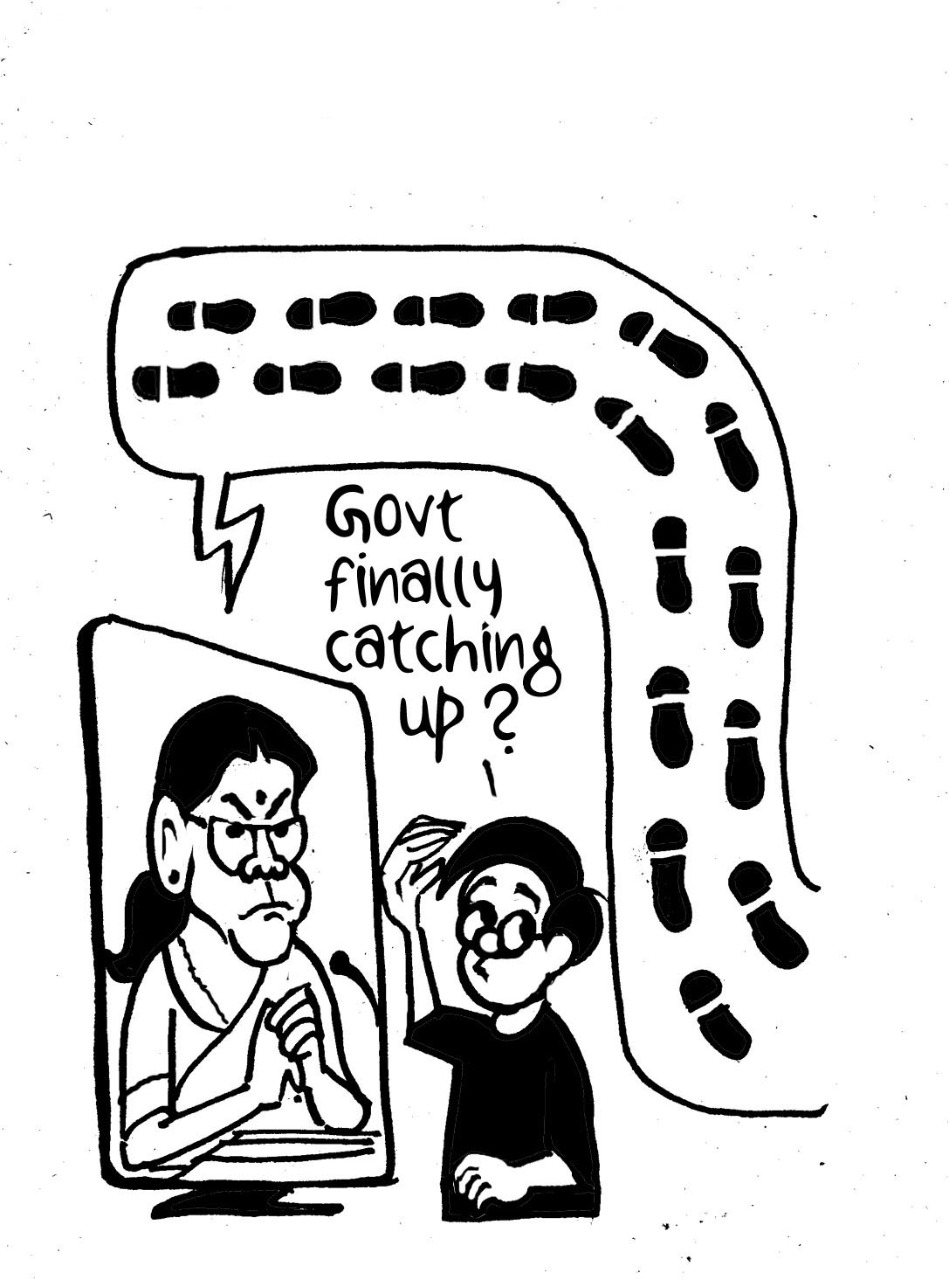
(This article was written for the book, Covid Infodemic: Problems, prospects and retrospect, Route maps of Kerala edited by Dr. S. R. Sanjeev.)

Works in the field of education and media. He writes in English and Malayalam. Not regularly, but occasionally.
